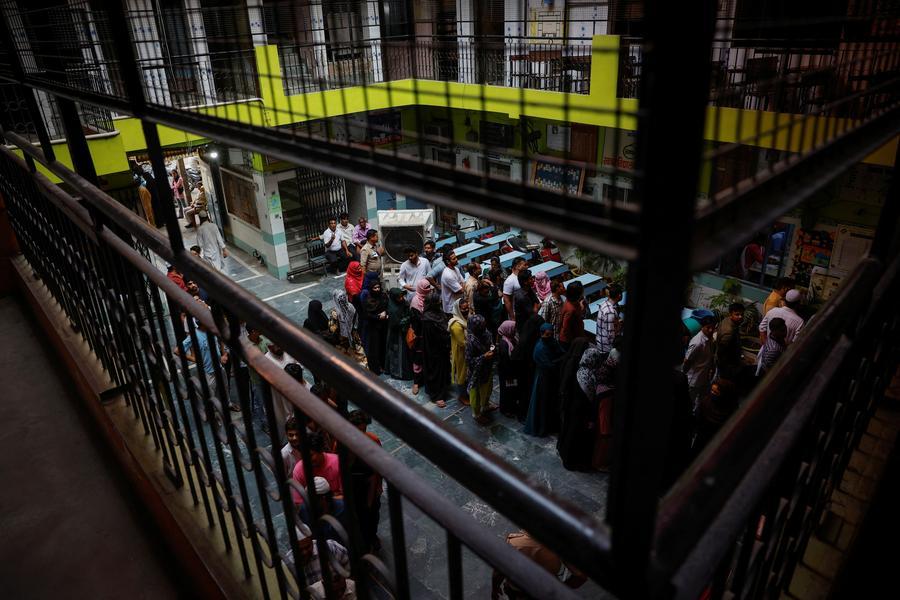
MUMBAI: India’s six-week long national election is in its final phase, with voting concluding on Saturday, and financial markets are keenly awaiting the verdict after counting scheduled for June 4.
Pollsters and political analysts differ on the possible outcome of the election, with lower voter turnout and apathy seen as risks for the government of Prime Minister Narendra Modi and his Hindu nationalist Bharatiya Janata Party (BJP).
The BJP and its allies won 352 of the 543 seats in India’s lower house of parliament at the last election in 2019 with the BJP alone winning 303 seats.
No exit polls are permitted before this year’s voting ends on Saturday, but the BJP was expected to sweep the election according to opinion polls in early April.
The shadow betting market, tracked by traders for cues, predicts the BJP will win close to 300 seats this time, about the same as in 2019.
Ahead of the 2024 verdict, here is how fund managers, analysts and economists expect markets to react under different scenarios:
BJP STRENGTHENS ITS POSITION
If the BJP wins a stronger majority than 2019, equity markets will rally in anticipation of growth-supportive economic policies, such as spending on infrastructure and a push for the manufacturing sector, said Rajesh Bhatia, chief investment officer of ITI Mutual Fund.
Benchmark indices S&P Sensex and NSE Nifty 50 could rally 4-5% in this scenario, said Abhishek Goenka, founder of IFA Global, a forex consultancy and asset management firm.
The rupee could appreciate to around 82.80 levels against the dollar from 83.32 at the close on Thursday, while the benchmark bond yield may dip to 6.90%-6.92% from near 7% currently, VRC Reddy, treasury head at Karur Vysya Bank.
Modi’s return is viewed by the market as a positive because it demonstrates political stability and implies policy continuity, said James Thom, senior investment director of Asian equities at abrdn, based in Singapore.
BJP HOLDS ON TO POWER BUT WINS FEWER SEATS
If the BJP and its allies win fewer seats than in 2019 but are still above the 272 seats needed to form a government, markets may see some volatility in the short-term but settle quickly.
The market seems to have already adjusted to the possibility that the margin of victory for BJP and its allies may be lower than earlier estimated, said Gaurav Dua, head of capital market strategy at Sharekhan, a brokerage.
A seat count below 300 for the current government will not alter the market’s trajectory, said Umeshkumar Mehta, chief investment officer at Samco Asset Management.
The rupee and bond yields may not see a significant reaction in this case either, said Vijay Sharma, senior executive vice president at PNB Gilts.
OPPOSITION-LED COALITION GOVERNMENT
A surprise BJP loss and the possibility of a coalition government led by Congress could lead to a sell-off in markets until the new government’s policies become clear.
The market is hoping for continuity, so another party winning could lead to a knee-jerk reaction, said Mittul Kalawadia, senior fund manager, equity, ICICI Prudential Mutual Fund.
“Whether in the long run things are positive or negative we will know later, but in the short-term any change which impacts policy level continuity will be a big negative,” Kalawadia said.
IFA Global’s Goenka said he expects an up to 10% fall in benchmark stock market indices in such a scenario immediately after the verdict, while Sharekhan’s Dua said the fall could be as large as 15-20%.
In this scenario, the central bank may intervene to stem a decline in the rupee, said Anindya Banerjee, head of foreign exchange research at Kotak Securities.
Foreign outflows in bonds could lead to an immediate rise of 10-15 basis points in yields, he said.
(Reporting by Bharath Rajeswaran in Bangalore; Ankur Banerjee in Singapore and Dharamraj Dhutia in Mumbai; Editing by Raju Gopalakrishnan)








